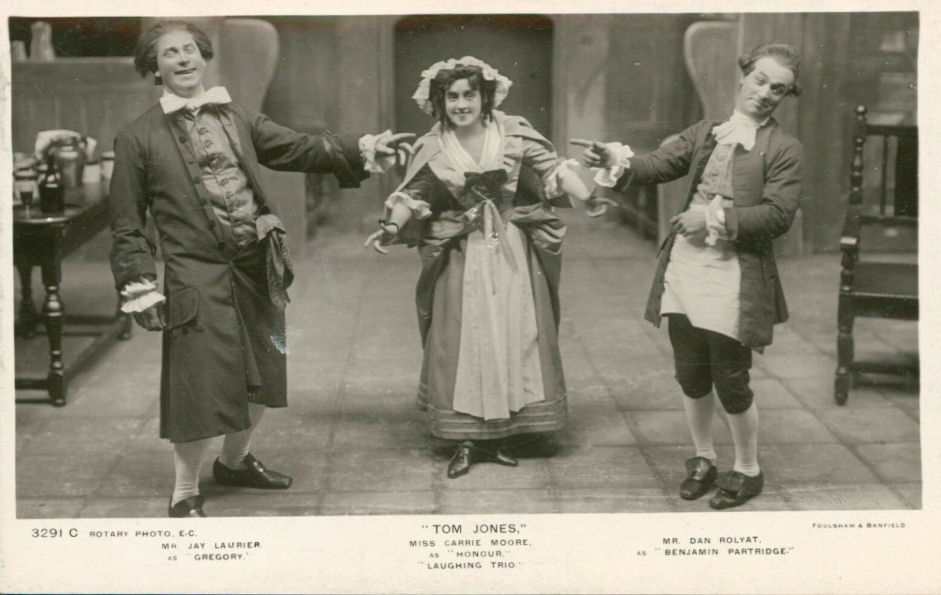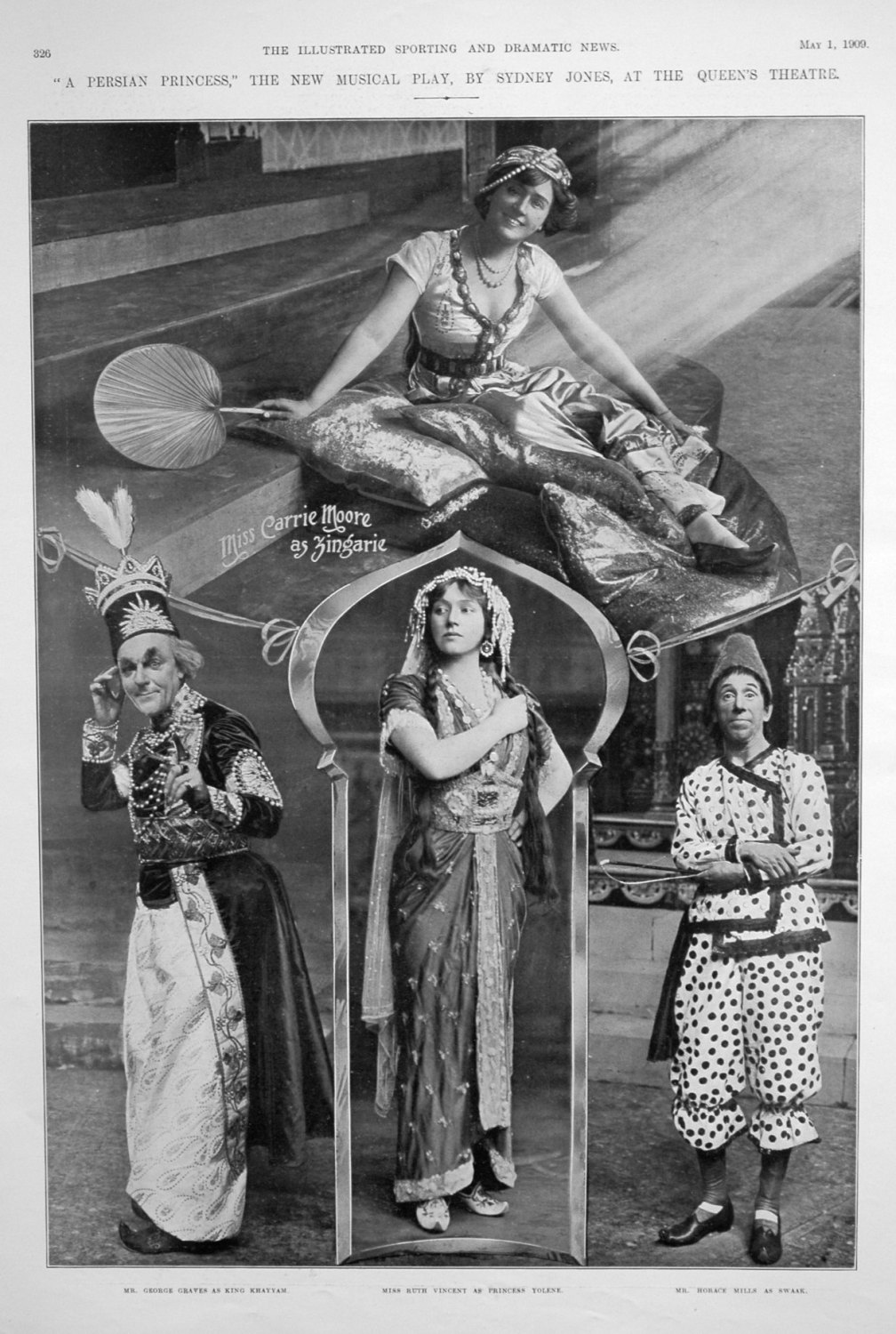|
Carrie Moore
Carrie Moore (31 July 1882 – 5 September 1956) was an Australian actress who achieved fame on the Australian and British stage. She was born Caroline Ellen Moore in Geelong, Victoria, on 31 July 1882, the third of the nine children of Robert William Moore, a labourer and Mary née Wyatt. She first appeared on stage in Geelong in local amateur productions. By late 1895, she had successfully auditioned for J. C. Williamson and was appearing in the Christmas pantomime, ''Djin Djin'', attracting positive reviews. After successfully understudying in 1897 and 1898, Moore performed for Williamson's "Royal Comic Opera Company" in a number of leading roles. In a highly publicized case she took Ernest Tyson to court alleging "breach of promise", in August 1901. The matter was settled out of court. In July 1903 she left Australia for England, where she appeared for producer George Edwardes. For five years she performed on the London stage and in provincial theatre, becoming "a muc ... [...More Info...] [...Related Items...] OR: [Wikipedia] [Google] [Baidu] |
The Cingalee
''The Cingalee'' or ''Sunny Ceylon'' is an Edwardian musical comedy in two acts by James T. Tanner, with music by Lionel Monckton, lyrics by Adrian Ross and Percy Greenbank, and additional material by Paul Rubens (composer), Paul Rubens.J. P. Wearin"Productions 1904: ''The Cingalee; or, Sunny Ceylon''" ''The London Stage 1900–1909: A Calendar of Productions, Performers, and Personnel'' (2nd edition, Scarecrow Press; 5 December 2013), p. 176 The story is set in the Edwardian era in the then-tranquil island of British Ceylon, Ceylon (modern-day Sri Lanka) and follows the story of British colonial tea planters (one of the most popular songs in the score is called "Tea, tea, tea"). The piece opened at Daly's Theatre in London, managed by George Edwardes, on 5 March 1904 and ran until 11 March 1905 for a total of 365 performances. The setting in an exotic Asian locale followed the precedent set by ''The Mikado'' that was continued in ''The Geisha'', ''San Toy'', ''The Nautch Girl'', ' ... [...More Info...] [...Related Items...] OR: [Wikipedia] [Google] [Baidu] |
Geelong, Victoria
Geelong ( ) (Wathawurrung language, Wathawurrung: ''Djilang''/''Djalang'') is a port city in Victoria, Australia, located at the eastern end of Corio Bay (the smaller western portion of Port Phillip Bay) and the left bank of Barwon River (Victoria), Barwon River, about southwest of Melbourne. With an estimated population of 282,809 in 2023, Geelong is the second-largest city in the state of Victoria. It is the administrative centre for the City of Greater Geelong municipality, which is Port Phillip's only regional metropolitan area, and covers all the urban, rural and coastal reserves around the city including the entire Bellarine Peninsula and running from the plains of Lara, Victoria, Lara in the north to the rolling hills of Waurn Ponds to the south, with Corio Bay to the east and the Barrabool Hills to the west. The traditional owners of the land on which Geelong sits are the Wadawurrung (also known as Wathaurong) Indigenous Australians, Aboriginal people of the Kulin natio ... [...More Info...] [...Related Items...] OR: [Wikipedia] [Google] [Baidu] |
George Edwardes
George Joseph Edwardes (né Edwards; 8 October 1855 – 4 October 1915) was an English theatre manager and producer of Irish ancestry who brought a new era in musical theatre to the British stage and beyond. Edwardes started out in theatre management, soon working at a number of West End theatres. By the age of 20, he was managing theatres for Richard D'Oyly Carte. In 1885, Edwardes became a manager at the Gaiety Theatre, London, Gaiety Theatre with John Hollingshead, who soon retired. For the next three decades, Edwardes ruled a theatrical empire including the Gaiety, Daly's Theatre, the Adelphi Theatre and others, and sent touring companies around Britain and abroad. In the early 1890s, Edwardes recognised the changing tastes of musical theatre audiences and led the movement away from Victorian burlesque, burlesque and comic opera to Edwardian musical comedy. Life and career Edwardes was born at Great Grimsby, Lincolnshire, England. He was the eldest of four sons and three ... [...More Info...] [...Related Items...] OR: [Wikipedia] [Google] [Baidu] |
Scene From Tom Jones 1907
Scene (from Greek ') may refer to: General * Scene (performing arts), a part of the story held in a single location * Scene (perception), a set of information that can flow from a physical environment into a perceptual system via sensory transduction Arts, entertainment, and media Music *Scene (subculture), a youth subculture from the early 2000s characterized by a distinct music and style Groups and performers * Scene, the stage name used by Japanese Punk guitarist Minoru Kojima * Selena Gomez & the Scene, an American band * The Scene (Canadian band), a late 1960s psychedelic Canadian band * The Scene (Dutch band), a Dutch band formed by Thé Lau Albums * ''Scene'', a 2005 noise album by Merzbow * ''Scenes'' (album), a 1992 music album by Marty Friedman * ''The Scene'' (Eskimo Callboy album), an Eskimo Callboy album * ''The Scene'', the debut album of The Scene Other uses in music * S.C.E.N.E. Music Festival, an annual festival held in downtown St. Catharines, Ontario, C ... [...More Info...] [...Related Items...] OR: [Wikipedia] [Google] [Baidu] |
The Merry Widow
''The Merry Widow'' ( ) is an operetta by the Austria-Hungary, Austro-Hungarian composer Franz Lehár. The Libretto, librettists, Viktor Léon and Leo Stein (writer), Leo Stein, based the story – concerning a rich widow, and her countrymen's attempt to keep her money in the principality by finding her the right husband – on an 1861 comedy play, (''The Embassy Attaché'') by Henri Meilhac. The operetta has enjoyed extraordinary international success since its 1905 premiere in Vienna and continues to be frequently revived and recorded. Film and other adaptations have also been made. Well-known music from the score includes the "Supernatural beings in Slavic folklore#Vila, Vilja Song", "" ("You'll Find Me at Maxim's"), and the "Merry Widow Waltz". Background In 1861, Henri Meilhac premiered a comic play in Paris, (''The Embassy Attaché''), in which the Parisian ambassador of a poor German grand duchy, Baron Scharpf, schemes to arrange a marriage between his country's rich ... [...More Info...] [...Related Items...] OR: [Wikipedia] [Google] [Baidu] |
A Persian Princess
''A Persian Princess'' is an oriental-themed Edwardian musical comedy in two acts, with a book by Leedham Bantock and P. J. Barrow, lyrics by Percy Greenbank and music by Sidney Jones (composer), Sidney Jones, with additional numbers by Marie Horne. It premiered on 27 April 1909 at the Sondheim Theatre, Queen's Theatre in London."''A Persian Princess'', The New Musical Play, by Sydney Jones, at the Queen's Theatre", ''The Illustrated Sporting and Dramatic News'', 1 May 1909, p. 326 Despite its experienced and highly regarded cast the show opened to poor reviews and had a short run of 68 performances, closing on 3 July 1909. Roles and original cast *Princess Yolene (King Khayyam's Daughter) – Ruth Vincent *King Khayyam – George Graves (actor), George Graves *Zingarie (a Clove Gatherer) – Carrie MooreRichards, Leann''The First Merry Widow: a biography of Carrie Moore''(2011), Google Books, accessed 16 April 2019 *Prince Hassan (Son of King Khayyam) – Clarence Blakiston *Prin ... [...More Info...] [...Related Items...] OR: [Wikipedia] [Google] [Baidu] |




